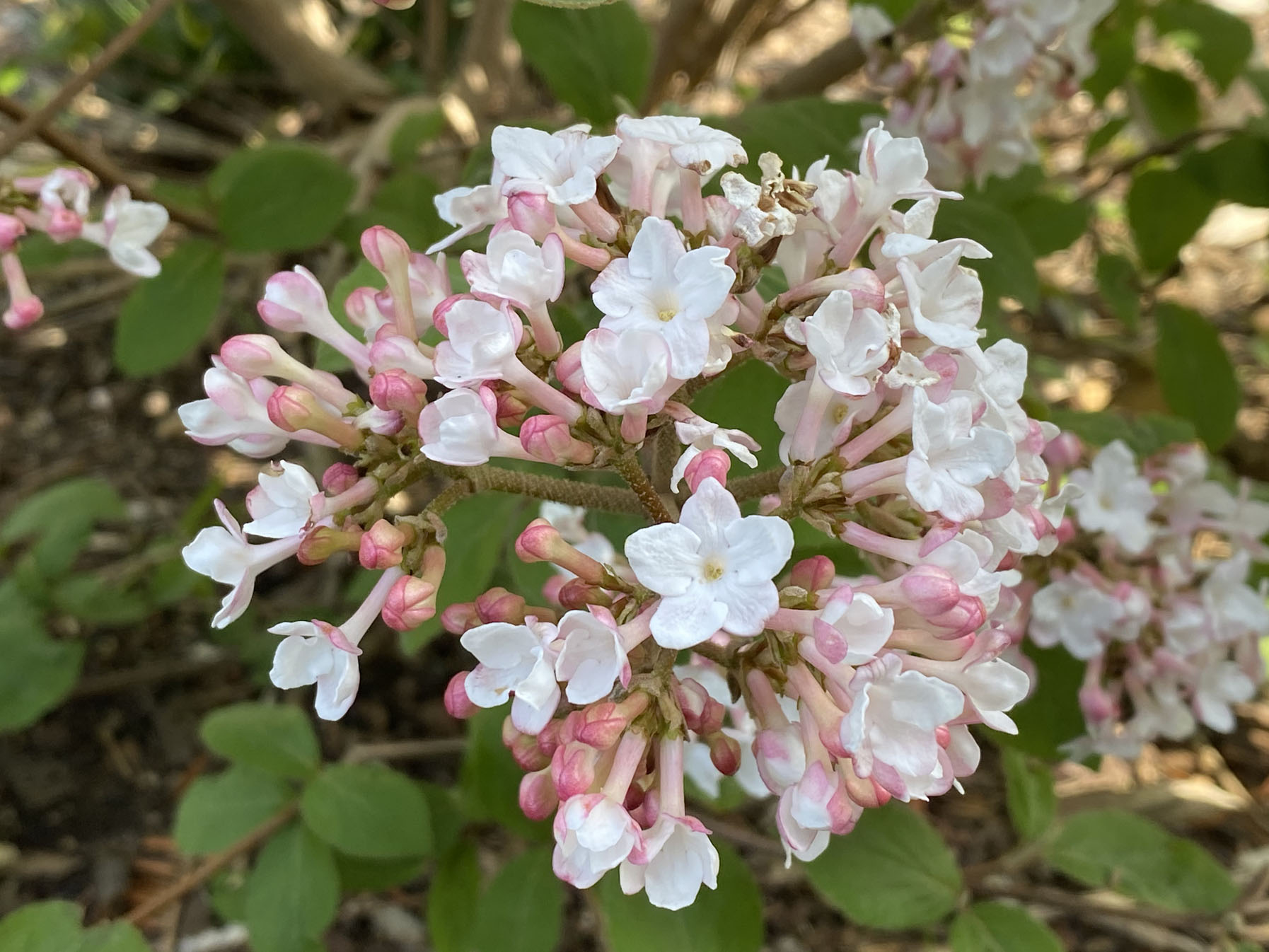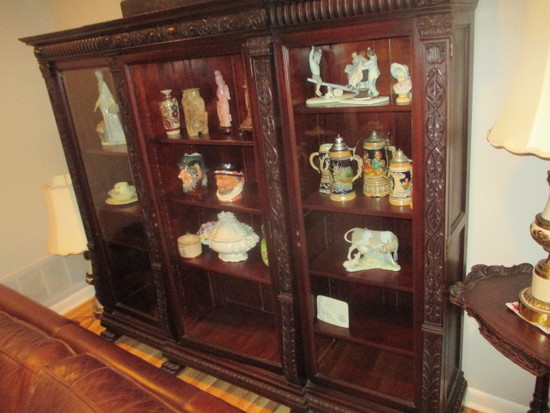
Gardening
Spring into the Growing Season

Korean Spice viburnum adds beauty and fragrance to the landscape.
Photo courtesy of MelindaMyers.com
Spring flowering bulbs and perennials are filling our landscapes with color. As your gardens come alive this spring, start making notes on needed improvements and provide some early season color and nectar for the pollinators. This will keep your landscape looking its best all season long and for years to come.
Start a garden journal or photographic record of your garden. Make notes or take pictures of what is working in your landscape, plants that need to be removed or areas where more color or new plants are needed. These notes will help as you create a landscape filled with year-round beauty.
Make sure your plants receive sufficient moisture. It is easy to overlook watering during the cool and often wet spring months. A rain gauge can help you monitor the rainfall in your yard. Plants benefit from thorough watering that encourages deep, drought and pest resistant roots. Check the soil moisture and water when the top four to six inches are crumbly and starting to dry. Established drought tolerant plants tolerate drier soil.
Start pulling weeds as they appear. Removing them when small makes removal easier and prevents them from flowering and producing seeds. That means fewer weeds to pull next year.
Disease and pest-free leaves, evergreen needles and other organic mulch covering the soil surface help suppress weeds, conserve moisture, and improve the soil as they break down. Leaves also provide homes for many insects, frogs, and toads. You'll achieve lots of benefits from this one task.
Leave perennials stand until daytime temperatures are consistently 50 degrees. This allows overwintering eggs to hatch and insects to exit their winter homes. If waiting is not an option, cut most stems back to the ground and stack them out of the way. This allows the insects to exit their winter homes when the time is right. Leave some stems standing 8 to 12" above ground so insects can form new homes. Chop up the removed plant material in mid-summer or fall to use as mulch in the garden or the compost pile.
Watch for animal damage and protect your plantings as needed. Fresh new growth in the spring garden makes a tasty treat for rabbits, deer, and other wildlife.
Many gardeners enlist the help of repellents to protect their landscape plants.
Always check the label for details on use, application rates and timing. Research has proven that odor-based repellents like rain and snow resistant Plantskydd (plantskydd.com) are more effective than other types of repellents. Plus, this will cause wildlife to avoid plants rather than taking a bite before they discover they don't like the taste.
Treat pathways used to access your landscape as well as key plants before the animals begin feeding. It is easier to keep them away before they find all the delicious plants growing in your garden.
Continue taking pictures of your landscape throughout the year. Make note of any challenges encountered and needed adjustments in care. Include any failures; all gardeners have them. These are just another step toward growing a healthier and more beautiful garden.
Then take time to enjoy the beauty of your landscape. Find a comfortable spot to sit, relax, listen to the birds, and take in all the wonders spring has to offer.
Melinda Myers has written more than 20 gardening books, including The Midwest Gardener's Handbook, 2nd Edition and Small Space Gardening. She hosts The Great Courses "How to Grow Anything" DVD series and the nationally-syndicated Melinda's Garden Moment TV & radio program. Myers is a columnist and contributing editor for Birds & Blooms magazine and was commissioned by Summit for her expertise to write this article. Her web site is www.MelindaMyers.com.
Antiques
Tips for Selling Personal Property for Estate Personal Representatives

Today's article features suggestions and tips for estate personal representatives (formerly called executors) as well as heirs to an estate.
According to the Massachusetts Department of Revenue, "If you're responsible for the estate of someone who died, you may need to file an estate tax return. If the estate is worth less than $1,000,000, you don't need to file a return or pay an estate tax." According to Connecticut's ct.gov website, "Connecticut's $5.1 million tax threshold ranks 9th for 2020 and its 12% top rate ties with Maine as the lowest." With the spike in housing prices and the Massachusetts threshold of $1 million, we are often contacted by estate personal representatives and attorneys for estate appraisals for IRS and probate purposes.
Whether you need a written appraisal or not, being an estate personal representative means that the person who asked that you be appointed trusted you to handle their estate. Of course, there is a lot of responsibility that comes with that. Here are my suggestions for handling the personal property in an estate.
- Secure the home as soon as possible. I've seen estates where neighbors and friends had keys. I've also seen instances where family members and others have taken things that didn't belong to them.
- Only throw away items that you are certain are trash. Some things like old postcards and costume jewelry may be more valuable than you think. It's best to have an auctioneer or estate sale company look through your items before you throw things away.
- You may have sentimental attachment to items that are part of an estate, but the personal property value is typically a small fraction of the value of the home itself.
- You should distribute items according to the will or any court decisions.
- With the other items, many families are able to discuss which things meant the most to them and decide how things should be divided among themselves. If the items have been appraised, others divide items based on the appraised value. If there are things that multiple people want or that no one wants, they may be consigned to auction.
- Moving everything out and storing items may seem like a good option at the time. However, I am often contacted by people who decided to do this and they are often paying storage fees of over $200 a month for items they ultimately decided they actually don't want to keep.
- It's much easier for an auctioneer or estate sale company to view and market pieces while they are inside a home. People can walk through and see the personal property instead of it being tightly packed inside of a storage unit.
- Regular readers of this column know that "brown furniture" (traditional mahogany, cherry, oak, and mahogany furniture), china and glassware haven't been selling well. It makes sense to sell or donate these pieces as soon as possible instead of paying thousands of dollars for storage costs and doing it later.
- Keep the things that have special meaning to you but consider selling the rest. I'm often contacted by clients who inherited things from family members that have been stored in their attics for decades.
- Consider whether you would rather have the collection you inherited or the money you'd receive by selling it. For example, a family member may have collected coins that you inherit. Coin values can appreciate or depreciate over time. Values were trending downward for several years. You may need to pay to store them in a bank safe deposit box. It may make more sense to sell the coins and invest in the stock market, pay for a child's education or take a family trip.
Our multi-estate auction with gold estate jewelry, coins, sports cards, historical memorabilia and other antiques and collectibles will begin soon. Please see our website https://centralmassauctions.com for this and other upcoming events.
Contact us at: Wayne Tuiskula Auctioneer/Appraiser Central Mass Auctions for Antique Auctions, Estate Sales and Appraisal Services www.centralmassauctions.com (508-612- 6111) info@centralmassauctions.com